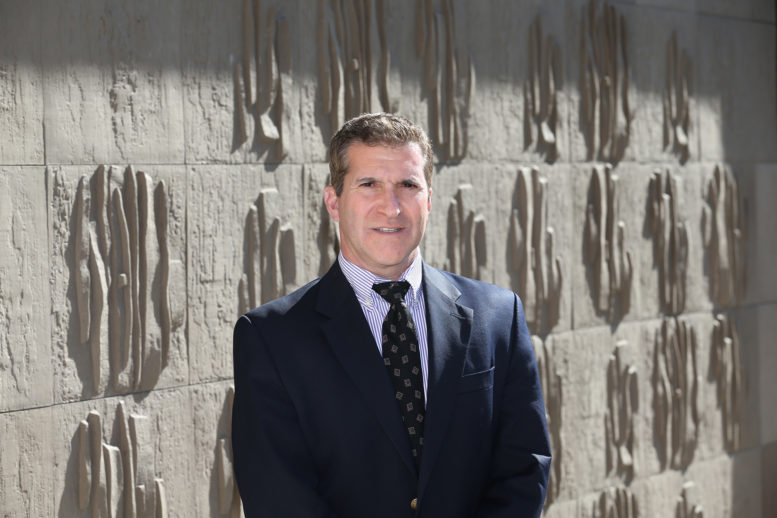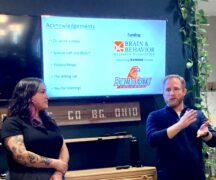By DAVID DUPONT
BG Independent News
When Eric Dubow, professor of clinical psychology, takes on a research project, he’s in it for the long run.
One study he’s been involved in started about the time he was born. Now his graduate students are using its data as the basis for their theses.
That’s more than a life’s work.
Earlier this month the Bowling Green State University Board of Trustees designated Dubow as a Distinguished Research Professor.
From the beginning of his graduate work at the University of Illinois-Chicago, Dubow’s scholarship has focused on “how the observation of aggression and violence, whether it’s in the media, the family, the neighborhood, leads someone to be more aggressive. … We develop a way of thinking, attitudes that justify violence as a behavioral choice. … But certainly there are some kids who observe these things who don’t become aggressive. So we look at protective factors.”
Positive parentings, social engagement, education, all can help foster resilience in young people, he said.
His graduate mentors were working on a longitudinal study of a cohort of people in Columbia County in New York, an area on the east side of the Hudson between Albany and New York City.
The study started in 1960. Researchers interviewed all the third graders in the county and their parents. Those subjects were 30 when Dubow joined the study as a graduate student. Now they are about 65, and the study includes interviews with their children.
In a longitudinal study ‘“you keep going back and interviewing them again and again and again.”
The study is now being conducted through the Institute for Social Research, a free standing research institute located at the University of Michigan. Dubow is a researcher at the institute as well as holding his position at BGSU. He affiliated with the institute in 1994, eight years after joining the BGSU faculty.
The study, he said, was the first to determine a link between seeing violence on television and aggressive behavior in children.
The institute is also studying children aged 8, 11 and 14 in Palestine and Israel. Every four years they’ve gone back and interviewed the youngsters and their parents in the home. “We’re looking at violent behavior and post-traumatic stress that develops as a result of exposure to political violence.”
While it’s obvious that exposure has a tendency to make these children, on both sides, more violent, Dubow is more interested in the factors that serve to protect them, even in a war zone. “The real story is the amount of resilience they have in toxic environments,” he said.
“A lot of the research focuses on resilience,” he said. “Many Palestinian kids don’t turn out to be violent or have post-traumatic stress syndrome. We’re going to have to know why are these kids are resilient if we’re going to develop programs to try to lessen the impact of exposure to violence. We might not always be successful in lowering the exposure, but we may be able to lessen the impact.”
Positive parenting clearly helps. But “as parents observe more violence, they become more stressed. They become more violent… … It’s about trying to bolster the parenting skills in .these kind of environments to use more positive punishment … rather than harsh punishment.”
Academic achievement and building kids’ self-esteem have also shown positive results. “The best approaches are multi-pronged,” he said. “But that’s hard to sustain.”
The results of this and other research done in the clinical psychology program at BGSU have an impact locally.
Members of the department, Doug Ullman and Bill Donnelly, helped found the Children’s Resource Center and Children’s First Council. Donnelly also spearheaded the formation of a crisis team that sends counselors in the schools when there’s the death of a student.
BGSU graduate students go into Kenwood and Crim elementary schools in Bowling Green to lead the I Can Do program that helps students experiencing the stress of parents separating or divorcing, poverty, death of a loved one, or bullying.
Dubow said he’s glad that being named a Distinguished Research Professor helps to highlight the work being done in the Psychology Department.
“They’re fortunate in Bowling Green, but those resources aren’t always available.”
The benefits go both ways. Schools and agencies get services, and students get experience. “For me that’s what makes our child clinical program so strong, our relationship with the community.”
BGSU was Dubow’s first teaching job. He was 26 when he arrived in 1986 after having spent a year at Yale University.
Dubow started his studies at Columbia University in New York City. Growing up in Queens, he went to college intent on being a sports writer. But Columbia didn’t have an undergraduate journalism program. He got a work-study job in the psychology department assisting graduate students who were doing research. So he majored in psychology. That experience led him to pursue graduate work in child clinical psychology.
“I have no interest in not working. I really enjoy this career,” Dubow said. The shifting population of graduate and undergraduate students “challenge you and make you better and bring you new experiences.”
The Institute for Social Research is in the first year of a study of the effects of the exposure to gun violence on adolescents and teenagers in Jersey City, New Jersey, and Flint, Michigan.
Dubow has just completed his first as editor of The Journal of Developmental Psychology. That position gives him another way to shape his field.
And he never knows what’s next. “Things come our way when we least expect them. We just try to develop programs to respond to different issues that develop in the community.”



